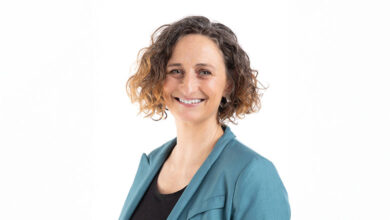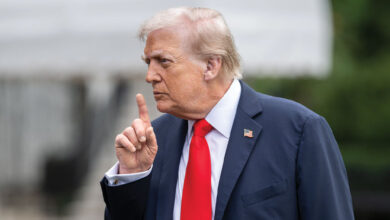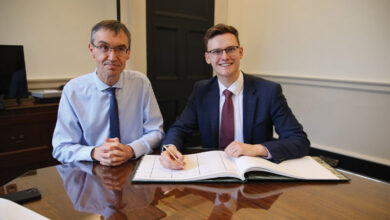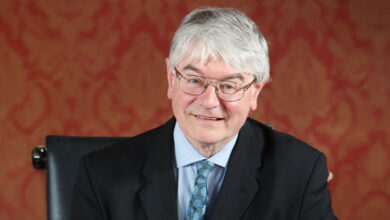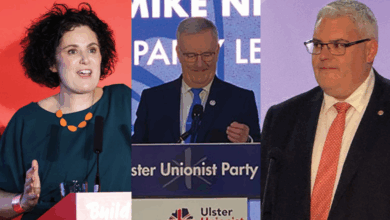Towards a European army
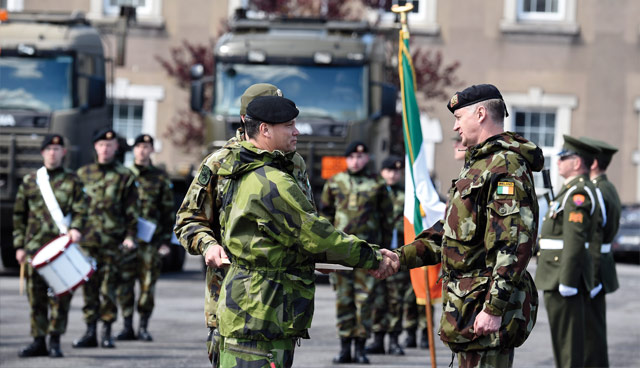
Citing hostile Russia-USA relations, a rising force in China and irregular migration on Europe’s borders, French President Emmanuel Macron has expressed support for a “true European army”; an idea backed by German Chancellor Angela Merkel in a November 2018 address to MEP’s in Strasbourg. eolas assesses calls for enhanced security cooperation in the context of an evolving Common Security and Defence Policy (CSDP).
Merkel’s concurrence with Macron was immediately followed by a statement from an EU commission spokesperson, who welcomed support for what it referred to as “a meaningful defence identity”, attributing credit for the concept to Jean-Claude Juncker, President of the European Commission: “Memory is short nowadays in Brussels but… you are aware of who launched this idea. We are delighted that both the President of the French Republic and the German Chancellor, with a few days interval, publicly backed this idea,” read the statement. “Let me clarify that the first one who spoke about the EU army four years ago was someone called Jean-Claude Juncker.”
Heightened calls for the formation of an EU army have followed the withdrawal of the United States from the 1987 INF nuclear treaty, prompting fears of resurgent cold-war relations and a new arms race between the rival blocs. Macron decried Europe as the “main victim” in the decision, leading to a cacophony of social media posts from Donald Trump, who tweeted: “They were starting to learn German in Paris before the US came along. Pay for NATO or not!”
Whilst several proposals have sought to foster greater European cooperation around defence, the EU has dismissed the idea that such efforts would amount to the creation of an army. At present, such cooperation is legislated for in the EU’s Common Security and Defence Policy, which forms a main component of the bloc’s Common Foreign and Security Policy (CFSP). As outlined in the Maastricht Treaty, the objectives of the CFSP are to:
- safeguard the common values, fundamental interests, independence and integrity of the Union in conformity with the principles of the United Nations Charter;
- strengthen the security of the Union in all ways;
- preserve peace and strengthen international security, in accordance with the principles of the United Nations Charter, as well as the principles of the Helsinki Final Act and the objectives of the Paris Charter, including those on external borders;
- promote international co-operation; and
- develop and consolidate democracy and the rule of law, and respect for human rights and fundamental freedoms.
The aims of the CFSP broadly fall under defence diplomacy, whereby military resources are peacefully deployed, often in aid of humanitarian or diplomatic operations. Indeed, whilst the EU has historically exercised some military power by policing treaties and implementing peacekeeping operations, the current CFSP continues to see the North Atlantic Treaty Organisation (NATO) as the body responsible for the defence of European territory. The unique relationship between EU forces and those of NATO were first encapsulated in a 1999 European summit in Helsinki, where the objectives and functions of the forces were described as “separable but not separate”.
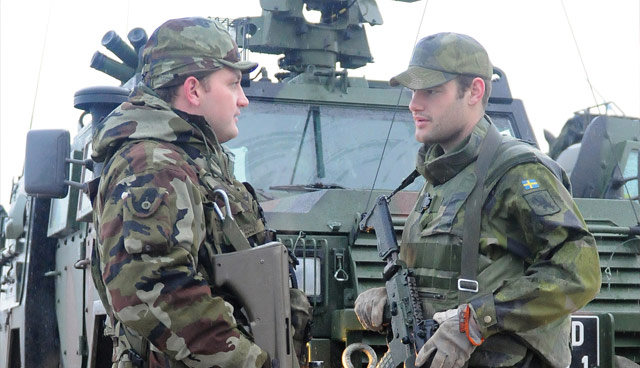
Calls for an EU army have been vague and largely open to interpretation, with public statements from French and German leaders offering no concrete suggestions around establishing an overarching European military. However, enhanced cooperation between member states has been progressed steadily since 2003, with 34 joint missions completed via the Common Security and Defence Policy. This cooperation was further bolstered with 2009 legislation that was activated in 2017, which saw 25 of the 28 armed forces of Europe operate more closely under a Permanent Structured Cooperation (PESCO) initiative.
At present, PESCO initiatives between EU member states represent the most significant level of military cooperation that have been secured thus far. Neutral states, including Austria, Finland, Ireland and Sweden are afforded space to continue a foreign policy of neutrality by following an opt-in, opt-out system. However, concerns have been raised as to how Permanent Structured Cooperation could ultimately affect Ireland’s international standing as a neutral state. The Irish State’s decision to participate in PESCO was passed in the Dáil by 75 votes to 42, with Taoiseach Leo Varadkar reaffirming that “what we are not going to be doing is buying aircraft carriers and fighter jets”. Denmark, Malta and the United Kingdom have opted out of the voluntary system.
The advancement of PESCO has prompted debate over the role of NATO: approximately 80 per cent of PESCO participants are member states of NATO. Formed primarily over doubts over US commitments to NATO, the EU has rejected analysis that suggests it may be in competition with NATO. Indeed, in her address to MEPs in Strasbourg, Angela Merkel insisted that “This is not an army against NATO, it can be a good complement to NATO”. Military force as a “complement” to NATO has also been welcome by NATO secretary general Jens Stoltenberg, who highlighted Military Mobility as a key aspect of NATO-EU cooperation, with NATO viewed as the central guarantor of European defence, whilst PESCO initiatives focus on crisis deployments.
A core element of the CSDP has seen the participation of Ireland in EU Battlegroups since January 2007, which fall under the control of the Council of the European Union. Current arrangements see EU battlegroups composed of up to 2,500 officers and soldiers, with Ireland falling within the Nordic Battlegroup. Whilst these groups have yet to see military action, further consolidation of a central European defence identity may see this condition change in the future.
Irish participation in European military action may be bolstered following a June 2018 budgetary announcement for 2021-2027 from the European Commission, which proposed to “increase the EU’s strategic autonomy” through a €13 billion European Defence Fund which would provide “financial firepower for cross-border investments in state-of-the-art and fully interoperable technology and equipment in areas such as encrypted software and drone technology”.
Announcements of heightened defence spending, further military cooperation and public messages of support for a “true European army” have followed a period of great geopolitical tension in Europe and across the world, including trade wars, Middle Eastern conflict, a protectionist US administration, a rising force in China and an uncompromising Russian premiership. Speaking at an election rally in Munich, Merkel said: “The times in which we could completely depend on others are, to a certain extent, over. I’ve experienced that in the last few days. We Europeans truly have to take our fate into our own hands. We have to know that we must fight for our future on our own, for our destiny as Europeans.”

